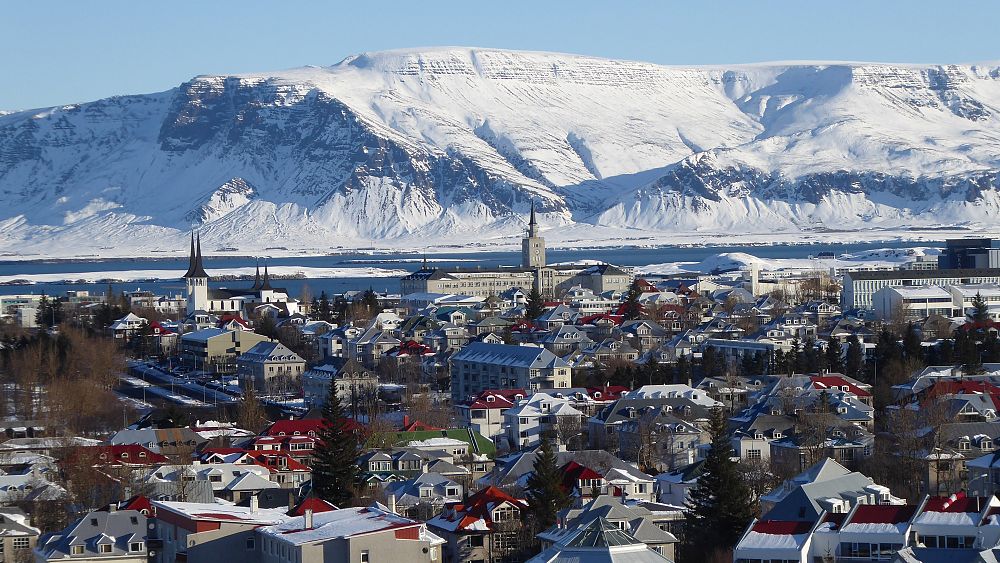Icelandic authorities have declared a state of emergency after hundreds of small earthquakes have rocked the Reykjanes Peninsula - the island nation’s most populated region - for more than two weeks.
Fagradalsfjall volcano has been threatening to erupt for days, Iceland's Met Office has said, adding that the likelihood of a volcanic eruption is high.
Authorities evacuated almost 4,000 people from a town located nearby over the weekend and they have only briefly been allowed back since to collect their belongings.
Despite lying just 10 miles north of the eruption site, Keflavik International Airport - Iceland's main international airport - has not been closed and flights are still arriving and departing.
If you are planning on travelling to or from the affected area, here are the full details on advice from European governments and which airlines are still operating flights.
Is there going to be a volcanic eruption in Iceland?
Iceland’s seismic activity began in an area just north of Grindavik, a fishing town of 3,400 people, which was evacuated last week.
A magma corridor under the surface now stretches 15 kilometres from just northwest of the town out into the Atlantic Ocean, according to the Civil Protection Agency.
The molten rock may now be very high up under the Earth's crust, Iceland's meteorological office has said. The latest data suggest a "significant likelihood of a volcanic eruption in the coming days".
In and around Grindavik, the seismic activity has already caused large cracks to appear in roads and golf courses.
Have flights to Iceland been cancelled?
Concerns have been raised over the impact seismic activity and potential eruption will have on travel.
Iceland’s authorities have raised their aviation alert to orange, indicating an increased risk of a volcanic eruption.
Volcanic eruptions can pose a serious hazard to air travel as ash released into the atmosphere can cause jet engines to fail, damage flight control systems and reduce visibility.
But flights are currently still operating as normal to the nearby Keflavik International Airport and access roads are all still open. There haven’t been cancellations or significant delays.
Most airlines have said that they will directly contact customers if this changes.
A major eruption in Iceland in April 2010 caused widespread disruption to air travel between Europe and North America. The quarter of a billion cubic metres of volcanic ash it ejected into the air led to more than 100,000 flights being cancelled over an eight-day period.
Though there have been fears of a repeat, Eyjafjallajokull volcano erupted under circumstances that contributed to the immense size of its ash cloud. A glacier on top of it caused meltwater to rapidly cool the lava, creating tiny particles which were launched into the air by the steam produced in the eruption. These were then carried on the wind towards Europe.
The eruption of Fagradalsfjall volcano would take place under very different circumstances lowering the chances of similar flight chaos. In the past three years, three eruptions have taken place on the Reykjanes Peninsula with no impact on air travel.
The European Aviation Safety Agency (EASA) is also better prepared for a major volcanic ash event.
"In the event of an eruption and development of an ash cloud, the agency will work with other aviation actors to assess the impact for aviation and make recommendations accordingly," a statement on the EASA's website reads.
Is it safe to travel to Iceland?
The UK Foreign Office is not currently advising against travel to Iceland but does warn that a volcanic eruption is increasingly possible.
“Earthquakes and indications of volcanic activity have increased above normal levels on the Reykjanes peninsula, southwest of Reykjavik,” the official advice reads.
“The Icelandic authorities continue to monitor the area closely, particularly the area northwest of Mt Thorbjörn near the Svartsengi power plant and the Blue Lagoon.
On 10 November, a Civil Protection Alert was declared after an intense swarm of earthquakes.”
Visitors are advised to stay away from the town of Grindavík and the surrounding area.
Ireland’s Department of Foreign Affairs similarly prohibits travel to the town and warns that “visitors to Iceland must follow the directions and guidance of the local authorities at all times.”
However, neither government has not issued a ‘no-go’ travel warning for Iceland meaning that airlines and holiday companies are operating as normal and travellers who cancel their bookings have no automatic right to a refund.
"We’d like to stress, that if the current FCO guidance remains advisory, insurance coverage stands as normal," says Jonathan Frankham, General Manager of travel insurance company World Nomads.
"However, if a natural catastrophe such as an earthquake, flood or volcano affects your travel plans and/or injures you must check your policy details. For example, at World Nomads, you need to have purchased your policy before these powerful forces of nature become a “known event” and be on an Explorer Plan for us to consider coverage."
The Blue Lagoon geothermal spa - one of Iceland’s biggest tourist attractions - temporarily closed on 9 November after being hit by earthquakes. Its closure has been extended until 30 November due to ongoing geological unrest.
“Earthquakes may intensify beyond what has already occurred, potentially leading to an eruption,” an update on its website reads.
“However, as of now, there are no indications of magma reaching the surface. The progress is being closely monitored.”
Surrounding spas, hotels and restaurants will also be closed.


